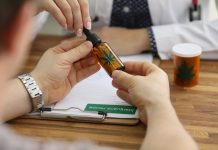
In two new studies from University College London and elsewhere, researchers found no evidence that people with the B.1.1.7. variant experience worse symptoms or heightened risk of developing long COVID compared with those infected with a different COVID-19 strain.
However, viral load and R number were higher for B.1.1.7., adding to growing evidence that it is more transmissible than the first strain detected in Wuhan, China, in December 2019.
The first study is a whole-genome sequencing and cohort study involving COVID-19 patients between November 9 and December 20, 2020.
The authors compared illness severity in people with and without B.1.1.7 and calculated viral load.
Among 341 patients who had their COVID-19 test swabs sequenced, 58% had B.1.1.7 and 42% had a non-B.1.1.7. infection.
No evidence of an association between the variant and increased disease severity was detected, with 36% of B.1.1.7. patients becoming severely ill or dying, compared with 38% of those with a non-B.1.1.7 strain.
Patients with the variant tended to be younger, with 55%of infections in people under 60 compared with 40% for those who did not have B.1.1.7.
The team also found those with B.1.1.7 were no more likely to experience severe disease. More patients with B.1.1.7 were given oxygen by mask or nasal cannula than those with a non-B.1.1.7. strain.
However, this is not a clear measure of disease severity, as patients may have received nasal prong oxygen for reasons unrelated to COVID-19, or as a consequence of underlying conditions.
They also found that B.1.1.7. samples tended to contain greater quantities of the virus than non-B.1.1.7. swabs.
In the second study, the team analyzed self-reported data from 36,920 UK users of the COVID Symptom Study app who tested positive for COVID-19 between 28 September and 27 December 2020.
The analysis covered 13 full weeks over the period when the proportion of B.1.1.7. grew most notably in London, South East and East of England.
The team found no strong associations between the proportion of B.1.1.7. within regions and the type of symptoms people experienced.
There was also no evidence of any change in the total number of symptoms experienced by people with B.1.1.7. The proportion of people who experienced long COVID was also not altered by B.1.1.7.
The reinfection rate was low, with 0.7% of those who reported a positive test before October 1, 2020, testing positive again more than 90 days later. The analysis found no evidence that the reinfection rate was altered by B.1.1.7.
However, the team found that B.1.1.7. increased the overall reproduction number, or R number, by 1.35 times compared with the original strain.
The findings suggest that, despite being more easily spread, the variant does not alter the type or duration of symptoms experienced.
If you care about COVID-19, please read studies about COVID-19 virus can spread during dental procedures and findings of these 2 blood types linked to lower risk of severe COVID-19.
For more information about COVID-19 and your health, please see recent studies about these existing drugs could be used against COVID-19 and results showing that this drug can be highly effective in treating COVID-19.
The study is published in The Lancet Infectious Diseases and The Lancet Public Health. One author of the studies is Dr. Eleni Nastouli.
Copyright © 2021 Knowridge Science Report. All rights reserved.



